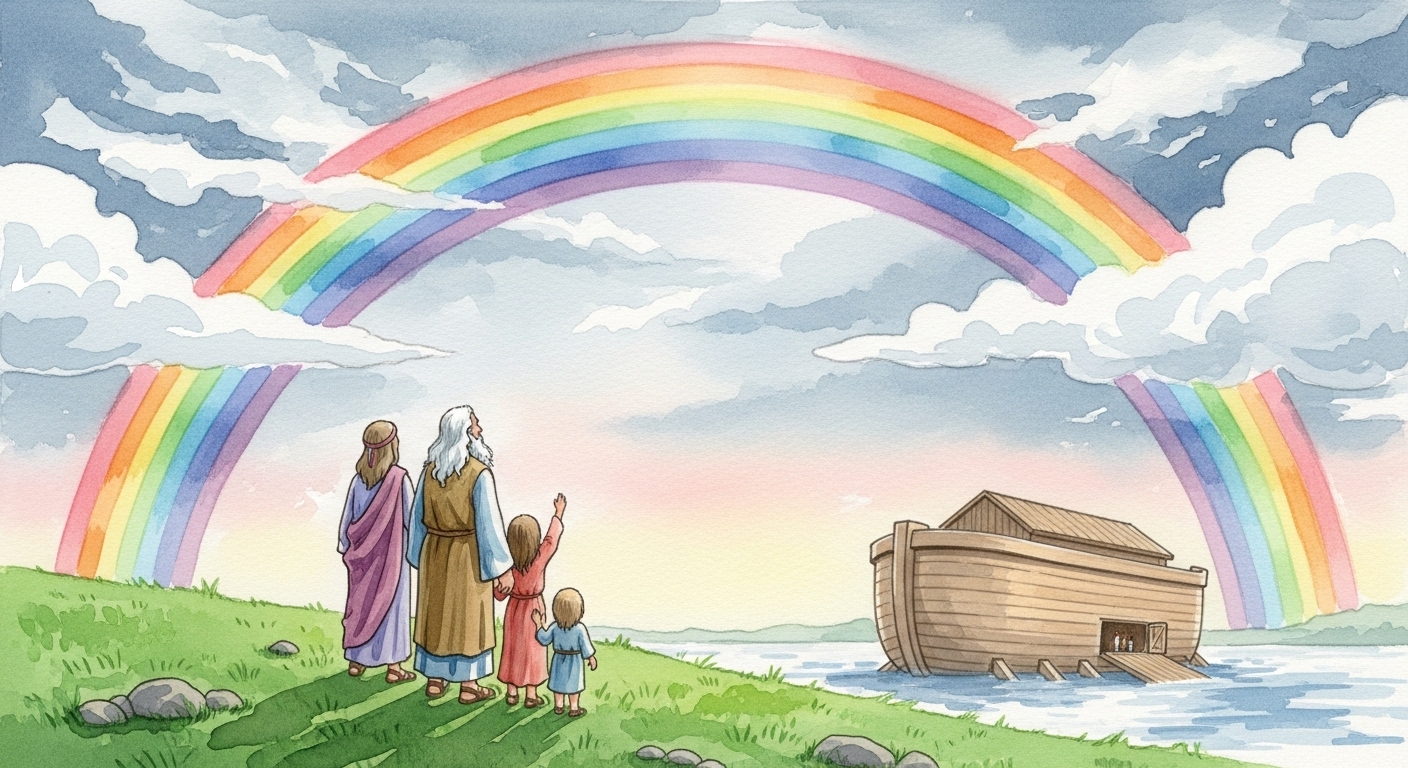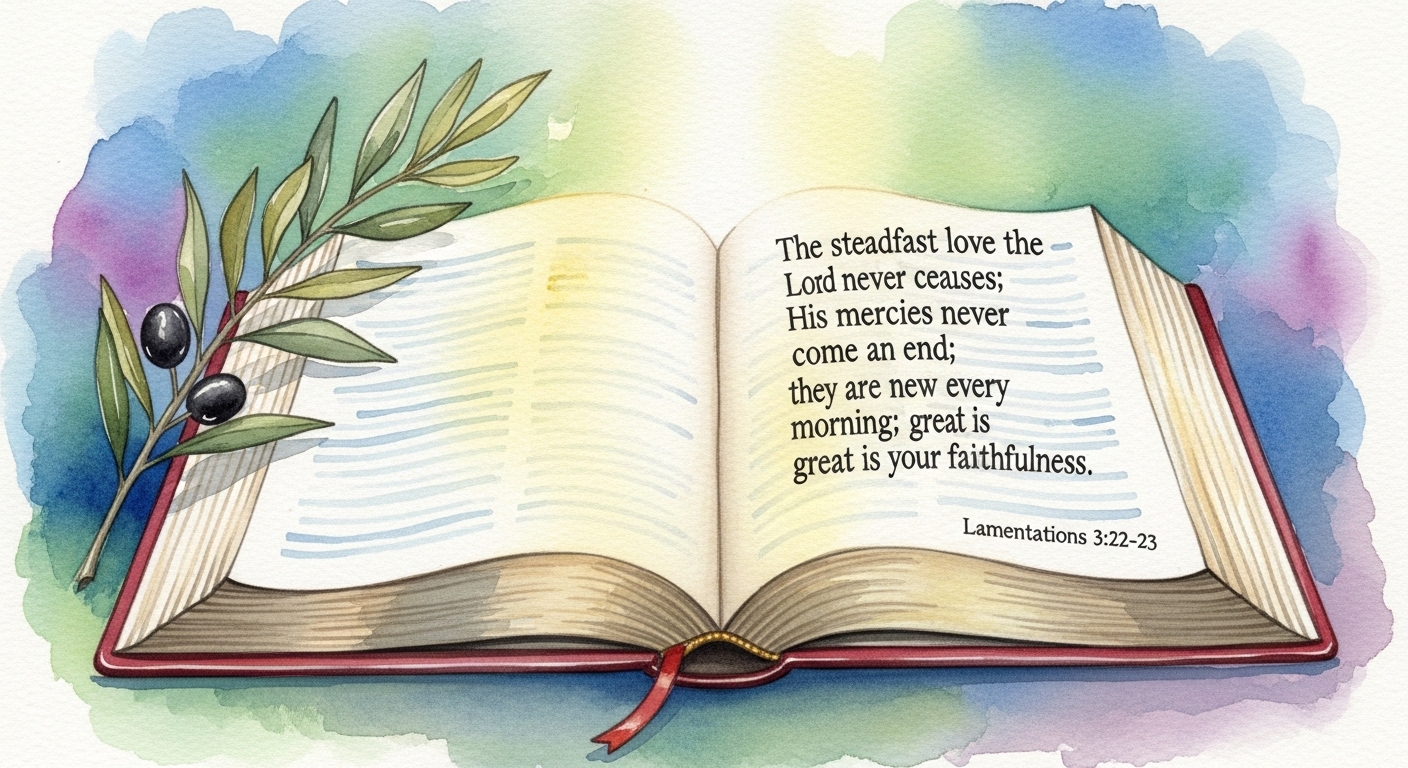The Rainbow After The Storm: Remembering God’s Faithfulness
You’ve been there — standing in the wreckage after a storm, literally or emotionally, searching the sky for signs that things will ever be alright again. When a storm rips through your life, leaving loss, confusion, and questions in its wake, it’s easy to feel abandoned. But the story of Noah and the rainbow reminds you of something at the very heart of faith: God’s faithfulness. The rainbow is not just a pretty arch across a clearing sky; it’s a symbol, a promise, and an invitation to remember that God keeps His word even after the most chaotic seasons.
The Story Behind the Rainbow: Noah’s Flood
When you read the account of Noah, you find a narrative of judgment, preservation, and covenant. God saw a world so broken that He decided to send a flood, and He chose Noah — a man who walked with God — to build an ark and preserve life (see Genesis 6:9-22). That ark became the refuge amid the deluge, and when the waters receded, God made a vow to never again destroy the earth by flood. That vow is anchored in the image of the rainbow, which God set in the clouds as a sign of the everlasting covenant (see Genesis 9:12-17). As you consider this story, it reminds you that amid catastrophe, God does not abandon His creation or His promises.
Chaos and Loss: The Reality of the Storm
The flood narrative honestly acknowledges chaos. In creation, humanity’s choices brought devastation; in response, God’s action brought both judgment and a plan for renewal. You’ll find this arc familiar: life’s storms often result from a mix of forces outside of your control and consequences of choices. The emotional and practical aftermath can leave you asking how a faithful God could allow such things. Yet in Noah’s story, the aftermath is precisely where God’s faithfulness becomes tangible — not by erasing the consequences, but by committing to a future where such destruction will not happen again (see Genesis 8:20-22). The promise doesn’t undo the past, but it reshapes the future, and that reshaping is a powerful testimony to God’s faithfulness.
When You Feel Overwhelmed
When you feel overwhelmed, it helps to remember that waiting, fear, and uncertainty were part of Noah’s experience, too. Noah and his family spent long stretches inside the ark with only God’s instructions and a hope that the storm would end. In your own life, the “ark” might look like seasons of prayer, sticking close to your community, or clinging to spiritual disciplines that keep you anchored. When you choose to trust amid the storm, you’re practicing a confidence in God’s faithfulness that aligns with the example Noah set (see Hebrews 11:7). Noah’s faith wasn’t passive; it was obedient work done in expectation of God’s promise.
God’s Promise After the Flood
After the waters receded and life began to reassert itself on the earth, God spoke a clear and comforting promise: He would never again destroy all living creatures with a flood (see Genesis 8:21-22; Genesis 9:12-17). The sign of that promise is the rainbow — an outward, visible marker set in the clouds to remind both God and humanity of the covenant. The symbolism is rich: clouds often bring storms, and the rainbow appears in the very place that once signaled doom. In other words, the reminder of God’s faithfulness shows up where pain and fear were once most vivid.

The Symbol of the Rainbow
You probably know people who use the rainbow as a secular symbol of hope after difficulty, and that makes sense — the imagery is universal. But in the biblical framework, the rainbow has a covenantal dimension. It’s a divine pledge that ties God’s character to His actions. The presence of the rainbow functions as a memory aid: it helps you remember that God is reliable, that He remembers His promises, and that His commitments are not contingent on human perfection. You can trust God’s faithfulness because it is rooted in His character, not in your performance (see Genesis 9:12-17).
How God’s Faithfulness Shows in Times of Waiting
Waiting stretches you. It tests your patience, your hope, and your identity. Noah waited — for the rains to stop, for the waters to abate, for dry ground, for God’s next word. In that waiting, God’s faithfulness was not just a distant idea; it was a presence that sustained his obedience. When you’re in the waiting room of life — a medical test result, a job search, a mourning season — remember that God’s faithfulness often becomes most evident through time. He keeps His word even when the fulfillment seems delayed. Scripture repeatedly affirms that God’s timing and promises are sure (see Lamentations 3:22-23). Those lines aren’t abstract platitudes; they’re anchor points for your soul when impatience knocks at the door.
Patience, Perseverance, and Trust
You cultivate patience by choosing trust in the small, daily decisions. Noah’s faithful labor — building the ark in a world that mocked and ignored him — is an example of perseverance. You might not be called to build an ark, but you are called to live faithfully in whatever God has entrusted to you. As you persevere, you learn to read the small signatures of God’s faithfulness: a conversation that opens a door, a timely provision, a peace that surpasses understanding. Those are often the quiet ways God keeps His promises before a dramatic rainbow appears. Remember that God’s faithfulness isn’t only in the rescue; it’s in the steady companionship that carries you through.
Signs in Nature and in Scripture
The rainbow is one sign among many where God uses creation to remind you of His character. Scripture repeatedly uses natural imagery to reflect divine promises and attributes. God’s commitments have a storied history — the same God who set a rainbow in the clouds is the same God who comforts, restores, and renews in other texts (see Isaiah 54:9-10; Psalm 89:1). Those passages show that God’s faithfulness is woven through the canon, not isolated to one story. That consistency invites you to recall instances of God’s reliability across the narrative of Scripture and in your own life.
When God’s Faithfulness Feels Silent
There will be seasons when God’s faithfulness feels silent — when prayers seem unanswered, when the sky stays gray, when the rainbow remains unseen. Those seasons can be the hardest because your heart longs for visible signs. The Bible acknowledges these tensions and encourages you to hold fast. Paul writes that all God’s promises are “yes” in Christ, a theological way to insist that God’s words are dependable even when your senses can’t yet confirm them (see 2 Corinthians 1:20). Hebrews exhorts you to “hold unswervingly to the hope you profess, for he who promised is faithful” (see Hebrews 10:23). Those texts aren’t abstract moralizing; they are practical lifelines meant to sustain you in seasons when God’s faithfulness feels distant.
Wrestling with Doubt
Doubt is not the opposite of faith; it’s often a pathway through which your faith matures. The psalmists model honest lament, and you’re allowed to bring your honest questions to God. In the space between complaint and trust, you learn how to anchor your heart not in feelings but in God’s reliable character. When doubt speaks loudly, counter it with testimony — written reminders, stories, moments when God was clearly present in your life or in the lives of others. Those memorials become spiritual scaffolding that helps you stand until the rainbow appears again.

Practical Ways to Remember God’s Faithfulness
It’s one thing to read about God’s faithfulness; it’s another to cultivate a memory that sources your hope in real time. You can take intentional steps to remember God’s faithfulness daily and in seasons of recovery.
- Keep a “rainbow” journal where you record little and big ways God has been faithful to you.
- Create tangible reminders — photographs, songs, Scripture verses — that help you recall God’s promises in moments of doubt.
- Share your story with others; testimony amplifies memory and blesses communal faith.
Each of these practices acts like a spiritual GPS, redirecting your heart toward God’s faithfulness when life feels disorienting. You’re training your soul to recognize God’s fingerprints in ordinary and extraordinary ways.
Testimonies: Stories Echoing the Rainbow
Stories are powerful. When you hear someone else recount God’s faithfulness, your heart registers the possibility that God could do the same for you. Whether it’s a friend who found provision at just the right moment or a family that experienced reconciliation after years of estrangement, testimonies provide living proof that God keeps His promises. The New Testament itself is full of testimonies that reinforce God’s trustworthiness. When you collect and share these stories, you participate in a tradition of remembrance that keeps hope alive across generations.
Modern-Day Arks
Your “ark” might look different than Noah’s, but the principle is the same: God calls you to obedience amid uncertainty. Those obedience decisions often place you in a posture to see God’s faithfulness unfold. Whether you’re stepping into a ministry, forgiving someone, choosing to love when you’ve been hurt, or simply deciding to pray for the next step, you are building a contemporary ark — a vessel of trust that invites God to act. When you look back, you’ll likely see a trail of providences that were invisible at the time but clear in hindsight.
Living as People Who Remember
Communal memory is crucial. The Israelites were instructed to pass down signs and stories so future generations would not forget God’s acts. You’re part of a community that can do the same. When you teach your children, mentor a friend, or lead a small group, you contribute to a culture of remembrance. That culture resists despair because it is saturated with examples of God’s faithfulness. Your faithfulness to tell the story of the rainbow encourages others to hold fast when storms come.
Spiritual Disciplines That Anchor Memory
Disciplines like Sabbath rest, regular Scripture reading, and corporate worship are not legalistic chores; they’re ways you reorient your life around God’s faithfulness. When you practice Sabbath, you acknowledge God as provider; when you read Scripture, you let the narrative of God’s faithfulness shape your imagination; when you worship with others, you participate in a communal memory that affirms God’s promises. Over time, these habits recalibrate your heart so that you anticipate God’s faithfulness rather than constantly doubt it.
Passing the Covenant Forward
The rainbow covenant is not just historical; it’s instructive. You’re called to live in a way that mirrors God’s commitment to steadfastness and mercy. That means keeping your promises, offering forgiveness, and working for justice in ways that reflect God’s character. When you uphold these relational covenants, you become a living reminder of God’s faithfulness to those around you. Your actions can be a rainbow to someone who’s still in the storm.
When Rescue Looks Different Than You Expected
Part of remembering God’s faithfulness is learning that God’s timing and methods don’t always match your expectations. Noah’s rescue was literal; he and his family were saved from physical annihilation. In your life, rescue may be emotional, relational, or spiritual, and sometimes it will be gradual rather than instantaneous. God’s faithfulness doesn’t always mean the immediate removal of hardship; it often means presence, provision, and transformation throughout the hardship. Recognizing that expands your ability to see God’s faithful work even in long seasons.
Reframing “Answered Prayers”
You might be tempted to evaluate God’s faithfulness solely by whether your prayers have been answered exactly as requested. A broader, truer measure is whether God is present and whether His promises ultimately stand. The rainbow covenant teaches you that God’s fidelity is not a transactional guarantee but a relational promise. Even in “no” or “wait” answers, there is a divine steadiness at work that aims toward redemption and restoration.
The Rhythm of Remembering and Rejoicing
When the storm clears and the rainbow appears, rejoicing is the natural response. Scripture models this rhythm — lament followed by thanksgiving, trial followed by testimony. You’ll find that as you remember God’s faithfulness more deliberately, gratitude becomes a habitual response. Gratitude in turn fuels hope, which strengthens your capacity to endure future storms. Celebrating God’s faithfulness publicly — through testimony, songs, and communal thanksgiving — reinforces that rhythm for yourself and for others.
Theological Heartbeat: God’s Faithfulness and Your Identity
At the deepest level, remembering God’s faithfulness shapes how you see God and how you see yourself. If you trust that your God is faithful, it changes your identity from someone who is abandoned to someone who is beloved and sustained. That identity shift affects decisions, relationships, and even your sense of vocation. When you live out of the conviction that God is consistently faithful, you’re more likely to take risks for love, extend mercy, and pursue justice because you’re rooted in a covenantal God who keeps His promises.
The Practice of Remembering as Spiritual Formation
Formally, remembering God’s faithfulness becomes part of how you are shaped into Christlikeness. The disciplines you adopt, the testimonies you share, and the communal practices you engage in all contribute to a spiritual architecture that ensures God’s faithfulness is not merely an abstract doctrine but a lived reality. The rainbow isn’t an endpoint; it’s a recurring call to remember, live out, and pass on the certainty that God keeps His word.
Resources for Digging Deeper
If you want to spend time studying the biblical texts and themes about God’s faithfulness, there are great places to start. Reading Genesis 6–9 closely will ground you in the flood narrative and the covenant of the rainbow (Genesis 6:9-22; Genesis 7:1-24; Genesis 8:20-22; Genesis 9:12-17). Supplement those readings with passages that highlight God’s enduring character, such as Lamentations 3:22-23, Isaiah 54:9-10, and 2 Corinthians 1:20. Those texts together will give you a robust biblical footing for remembering God’s faithfulness across contexts.
Practical Next Steps You Can Take Today
You don’t have to wait for the next storm to start practicing remembrance. Begin with small, concrete steps that will position you to notice God’s faithfulness more readily:
- Start a short “13-day” memory practice: each day, write one instance of God’s faithfulness and why it mattered.
- Read Genesis 6–9 slowly this week and journal your emotional responses to the promises God made.
- Share one brief testimony of God’s faithfulness with a friend or in your small group.
- Select one verse about God’s faithfulness (like Lamentations 3:22-23) and memorize it to recite in hard moments.
These practical steps create neural and spiritual pathways that help you remember God’s faithfulness when storms return.
Conclusion: The Rainbow After the Storm
You will face storms. They may be personal, communal, or global. But the rainbow after the storm is not accidental; it’s a sign that God keeps His word. The story of Noah teaches you that God’s faithfulness endures through chaos and loss, that He preserves life, and that He makes promises to secure the future. Remembering God’s faithfulness is a discipline and a delight. It helps you reframe suffering, practice hope, and live in the confidence that He who promised will indeed be faithful.
If you’re in the storm right now, hold on — not to the storm itself, but to the one who promised the rainbow. Start collecting your memories of God’s faithfulness, share them when you can, and build a life that points others toward the covenant-keeping God you serve. The rainbow is not merely a decorative arch in the sky; it’s a daily invitation to remember and proclaim that God’s faithfulness remains steadfast.
Explore More
For further reading and encouragement, check out these posts:
👉 7 Bible Verses About Faith in Hard Times
👉 Job’s Faith: What We Can Learn From His Trials
👉 How To Trust God When Everything Falls Apart
👉 Why God Allows Suffering – A Biblical Perspective
👉 Faith Over Fear: How To Stand Strong In Uncertain Seasons
👉 How To Encourage Someone Struggling With Their Faith
👉 5 Prayers for Strength When You’re Feeling Weak

📘 Jesus and the Woman Caught in Adultery – Grace and Mercy Over Judgement
A powerful retelling of John 8:1-11. This book brings to life the depth of forgiveness, mercy, and God’s unwavering love.
👉 Check it now on Amazon 🛒💥
🔥 “Every great message deserves a home online.” 🌍💬🏡
Don’t let your calling stay hidden. Start a Christian blog or website using Hostinger — with 99.9% uptime, a free domain, and SSL, your voice can shine for God’s glory anytime, anywhere.
💥 Begin today. 🛒 Try it RISK-FREE! ✅
✝️ “Your body is God’s temple — care for it with purpose.” 💪💖🏛️
Renew your energy and restore balance naturally. Mitolyn helps support a healthy metabolism, giving you the vitality to live out God’s calling with strength and confidence.
🔥 Unlock Your Metabolic Power! ⚡Burn More Calories & Feel Great With Mitolyn. 💪
👉 Start Today. 🚀 Check Price Now. 🛒💰
💰 As a ClickBank & Amazon Affiliate, I earn from qualifying purchases.
📖 Acknowledgment: All Bible verses referenced in this article were accessed via Bible Gateway (or Bible Hub).
🚀 Want to explore more? 👉 Dive into our new post on Why Jesus? and experience the 🔥 life-changing truth of the Gospel!






